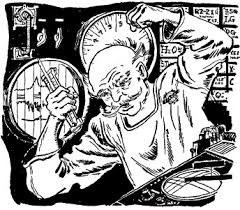Note that your final mark will not be saved in the system.
Themes, Ideas and Messages GapFill
You must fill all the gaps before clicking ‘Check Answers!’

This quiz relates to AO1 and AO3.
After discovering a text by Cornelius Agrippa, Victor is inspired to study the writings of and . This is early evidence of Victor's ambition and intellectual curiosity; he interprets his own interest in these writings as a desire to understand , and initially believes the answers to lie in the study of . However, while appreciating the industriousness of modern , Victor always feels unsatisfied after reading their works. He considers a quotation by Sir , that he felt 'like a child picking up beside the great and unexplored ocean of truth' (Chapter 2). Although just a boy, Victor considers Newton's successors in the field of to be by comparison to the renowned scientist. However, the deaths of both Frankenstein and the monster in the icy wastes of the North Pole reveal Victor's folly in placing all his efforts and faith in science, as it cannot shape to its will. Victor's work is bound up with the idea of his personal . This idea is reinforced by the way he repeatedly alludes to his fate and his for knowledge, firstly, and then for revenge against the monster, as if these courses of action were as necessary to him as water. It can be argued that Shelley's novel, in its concern with Victor's story as one of predetermined destiny and punishment for defying the natural order, owes much to the era of literature and the idea of .